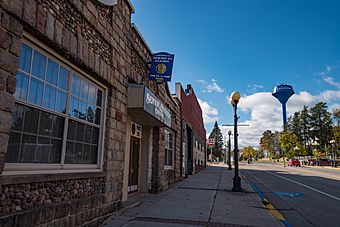Chisholm Commercial Historic District facts for kids
Quick facts for kids |
|
|
Chisholm Commercial Historic District
|
|

The 300 block of W. Lake Street looking west
|
|
| Location | W. Lake Street between Central Ave. & 4th Ave., east side of Central Ave between 1st St. NE & 1st St. SE, and 6–8 1st Ave. SW, Chisholm, Minnesota |
|---|---|
| Area | 19.2 acres (7.8 ha) |
| Built | 1908–1929 |
| Architect | Multiple |
| Architectural style | Neoclassical, Renaissance Revival, Romanesque Revival |
| NRHP reference No. | 16000512 |
| Added to NRHP | August 4, 2016 |
The Chisholm Commercial Historic District is a special area in Chisholm, Minnesota. It's like a time capsule of the town's main street. Here you can see many old shops and buildings.
These buildings are mostly one or two stories tall. They were all built after a big fire in 1908. This fire destroyed most of the old downtown. Construction stopped around 1929, when the Great Depression began.
This district is found on Lake Street West. It stretches between Central Avenue and 4th Avenue West. Some buildings on Central Avenue and 1st Avenue are also part of it. The area was added to the National Register of Historic Places in 2016. This means it's an important historical site.
What Makes This District Special?
The Chisholm Commercial Historic District is important for many reasons. It shows how Chisholm grew into a busy town. It became a central place for shopping and fun. It was also a key spot for community life in the Mesabi Range area.
A Town Rebuilt After a Fire
On September 5, 1908, a huge fire swept through Chisholm. It destroyed almost the entire downtown area. But the people of Chisholm didn't give up. They quickly rebuilt their town.
The buildings you see today were constructed after this fire. They show the spirit of the town. This period of rebuilding lasted until 1929. That's when the Great Depression started.
What Kinds of Buildings Are There?
The district has many different types of buildings. Most are commercial, meaning they were shops or businesses. There are also some public buildings. You can even find a park within the district.
When the district was added to the National Register, it had 55 "contributing properties." These are buildings that still look like they did back then. They help tell the story of the district. There were also 31 "non-contributing properties." These buildings were either built later or changed too much.



